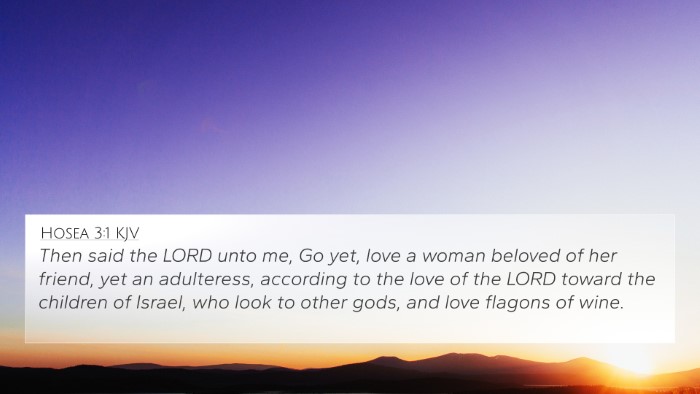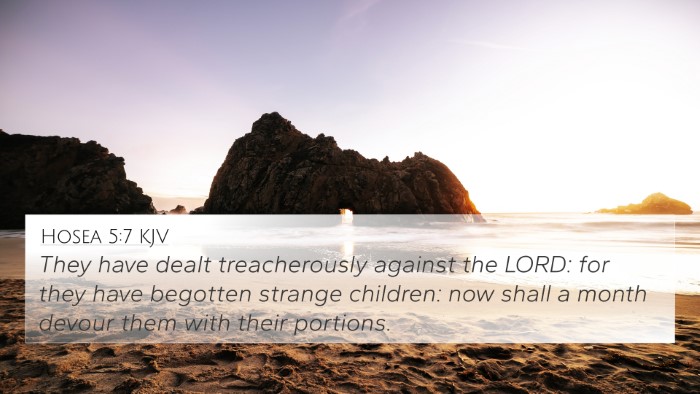Meaning and Interpretation of Jeremiah 3:20
Jeremiah 3:20 states: "Surely, as a wife treacherously departs from her husband, so have ye dealt treacherously with me, O house of Israel, saith the Lord." This verse encapsulates the spiritual infidelity of Israel towards God, using a poignant metaphor of marital unfaithfulness. The portrayal of God as a jilted husband evokes a deep emotional response, emphasizing the profound nature of Israel's betrayal.
Summary of Insights from Public Domain Commentaries
Matthew Henry's Commentary
Henry interprets this verse within the framework of the covenant relationship between God and Israel. He highlights the serious nature of forsaking God, likening it to a wife leaving her husband. This imagery draws attention to God’s fidelity and Israel's unfaithfulness, illustrating their failure to uphold their covenant obligations. Henry remarks that such spiritual treachery is not merely an act of rebellion but a significant violation of trust that damages the relationship with God.
Albert Barnes' Notes
Barnes provides insight into the significance of the metaphor. He emphasizes that this relationship signifies the bond between God and His people, where unfaithfulness results in estrangement and broken communion. He further explains that "dealt treacherously" suggests a premeditated betrayal, which emphasizes the severity of Israel's actions against their divine spouse—God. The call to recognition and repentance is evident in his commentary, highlighting God's desire for restoration despite the betrayal.
Adam Clarke's Commentary
Clarke focuses on the implications of this verse within the broader narrative of Israel’s history. He notes how the imagery of marital unfaithfulness reflects the ongoing disobedience of Israel throughout generations. Clarke argues that this analogy serves as a warning to those who partake in the same sins, urging them to return to God. He also mentions that God's appeals to Israel are consistent, indicating His ongoing love and desire for reconciliation despite their repeated transgressions.
Bible Cross-References Related to Jeremiah 3:20
- Hosea 1:2: The imagery of unfaithful love is further developed.
- Isaiah 54:5: God is depicted as a husband to Israel.
- Ezekiel 16:32: This passage speaks explicitly about Israel's betrayal.
- James 4:4: Describes friendship with the world as enmity with God.
- Malachi 2:14: Highlights the treachery of unfaithfulness in relationships.
- Romans 1:21-23: Discusses the exchange of truth for lies, similar to spiritual unfaithfulness.
- 1 Corinthians 10:4: Indicates how spiritual betrayal occurs through idolatry.
Understanding Spiritual Infidelity
The concept of spiritual infidelity resonates throughout the Bible, illustrating how God's people are often tempted to stray away from their commitment to Him. This theme recurs in various scriptures where God expresses His sadness over His people's decisions to pursue false idols or sin. The use of marital imagery serves to reinforce the personal and relational dynamics of this infidelity, showing the deep hurt caused to God by His people's actions.
Thematic Connections with Other Scriptures
This verse serves as a pivotal point for connecting various biblical themes such as fidelity, covenant relationship, repentance, and divine mercy. In examining these inter-biblical dialogues, we see parallels and contrasts that deepen our understanding of the nature of God and His relationship with His chosen people.
Tools for Bible Cross-Referencing
Utilizing tools for Bible cross-referencing can enhance your study and comprehension. A good Bible concordance or a cross-reference guide can aid in identifying verses related to Jeremiah 3:20, showcasing themes of fidelity and betrayal across the Scriptures.
How to Use Cross-References in Study
Understanding how to find cross-references in the Bible can enrich one's study of themes like God's faithfulness and human infidelity. Engaging with comparative Bible verse analysis allows for a deeper theological exploration of related scriptures and their applications in our spiritual lives.
Conclusion
Jeremiah 3:20 stands as a poignant reminder of the seriousness of unfaithfulness in our relationship with God. Through the insightful interpretations of various commentaries, we can appreciate the depth of emotion conveyed in this verse and the urgency of God’s call for a return to faithfulness. By examining the connections to other scriptural texts, believers are encouraged to reflect on their own commitments and the importance of fidelity in their walk with God.











